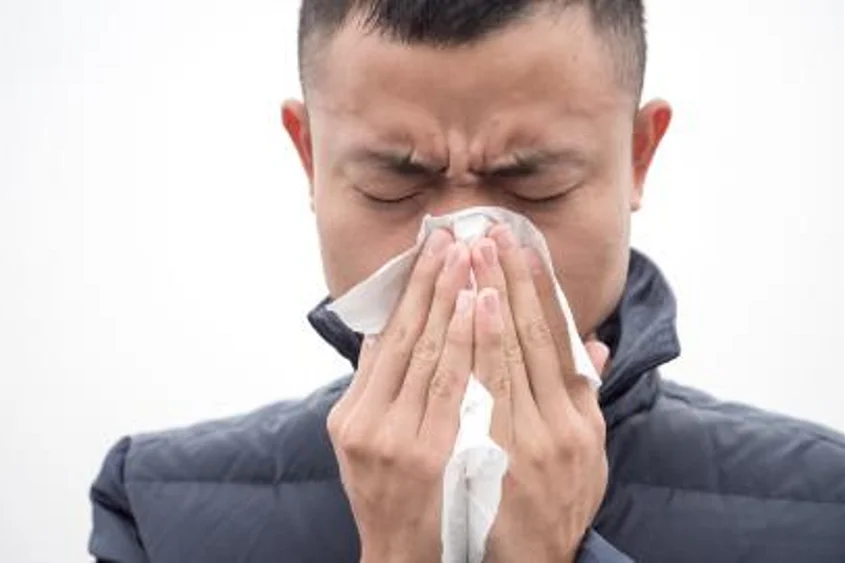Understanding Sinus Infections: Are They Contagious?
- Updated on: Feb 27, 2024
- 3 min Read
- Published on Jan 10, 2024

One common question that often arises is whether sinus infections are contagious. In this comprehensive guide, we’ll delve into the intricacies of sinus infections, exploring their causes, symptoms, and contagious aspects, if any.
What Are Sinus Infections?
Sinus infections occur when the tissues lining the sinuses become inflamed, usually due to a viral, bacterial, or fungal infection. The sinuses are air-filled cavities located in the skull, and when they become blocked and filled with fluid, it creates an environment conducive to infection. There are several types of sinusitis, including acute, subacute, chronic, and recurrent, each with its own characteristics and duration.

Causes of Sinus Infections
Viral Infections: The majority of sinus infections are caused by viruses, often stemming from the common cold or flu. These infections are usually self-limiting and resolve on their own with time.
Bacterial Infections: In some cases, sinusitis may be caused by bacteria. Bacterial sinus infections tend to be more persistent and may require antibiotic treatment.
Fungal Infections: Although less common, fungal infections can also lead to sinusitis, especially in individuals with compromised immune systems.
Symptoms of Sinus Infections
Recognizing the symptoms of a sinus infection is crucial for timely intervention and effective management. While symptoms may vary depending on the type and severity of the infection, common signs include:
Nasal congestion: Difficulty breathing through the nose due to blockage.
Facial pain or pressure: Discomfort around the eyes, nose, and forehead.
Headache: Often described as a dull, persistent ache.
Discolored nasal discharge: Yellow or green mucus may indicate a bacterial infection.
Coughing: Particularly when the infection involves the lower respiratory tract.
Fatigue: Sinus infections can be draining, leading to overall tiredness.
Contagious Nature of Sinus Infections
Now, let’s address the pressing question: Are sinus infections contagious? The answer is both yes and no, depending on the underlying cause.
Viral Sinus Infections:
Viral sinus infections, commonly associated with the cold or flu, are contagious. The viruses responsible for these infections can be transmitted through respiratory droplets when an infected person coughs or sneezes. Additionally, touching surfaces contaminated with the virus and then touching the face can contribute to the spread.
Preventive Measures for Viral Sinus Infections:
Frequent handwashing: Proper hand hygiene is essential to prevent the spread of viruses.
Respiratory etiquette: Covering the mouth and nose when coughing or sneezing helps contain respiratory droplets.
Avoiding close contact: Minimize contact with individuals who have respiratory infections to reduce the risk of transmission.
Bacterial Sinus Infections:
Bacterial sinus infections, on the other hand, are generally not contagious in the same way viral infections are. These infections are often secondary to a preceding viral infection, and the bacteria responsible are not typically transmitted through casual contact.
Preventive Measures for Bacterial Sinus Infections:
Properly managing viral infections: Timely treatment of viral infections can help prevent secondary bacterial sinusitis.
Good respiratory hygiene: Practicing good respiratory hygiene can reduce the risk of developing viral infections that may lead to bacterial sinusitis.
Diagnosis and Treatment
When symptoms of a sinus infection are present, seeking medical advice is crucial for an accurate diagnosis and appropriate treatment. Healthcare professionals may conduct a thorough examination and, in some cases, order imaging tests to assess the extent of the infection.
Diagnostic Methods
Clinical Assessment: A healthcare provider will evaluate symptoms, and medical history, and perform a physical examination.
Imaging: X-rays, CT scans, or MRIs may be recommended to visualize the sinuses and identify any abnormalities.
Treatment Approaches
Viral Sinus Infections: Rest, hydration, and over-the-counter medications may be recommended to alleviate symptoms. In some cases, antiviral medications may be prescribed.
Bacterial Sinus Infections: Antibiotics are the primary treatment for bacterial sinus infections. It’s essential to complete the full course of antibiotics, even if symptoms improve before completion.
Symptomatic Relief: Nasal decongestants, saline nasal sprays, and pain relievers may be recommended to manage symptoms.
Prevention Strategies
Preventing sinus infections involves adopting healthy habits and minimizing exposure to potential triggers. Consider the following preventive measures:
Maintain Good Hygiene: Wash hands regularly, especially during cold and flu seasons.
Stay Vaccinated: Annual flu vaccinations can reduce the risk of viral infections that may lead to sinusitis.
Manage Allergies: Addressing allergic triggers can help prevent recurrent sinus infections.
Humidify the Air: Using a humidifier can keep the nasal passages moist, reducing the risk of infections.
When to Seek Medical Attention
While many cases of sinusitis resolve with at-home care, certain situations warrant prompt medical attention:
Severe Symptoms: If symptoms are severe or worsening despite home remedies.
Persistent Infections: If symptoms last longer than 10 days without improvement.
High Fever: A fever over 102°F (38.9°C) may indicate a more serious infection.












